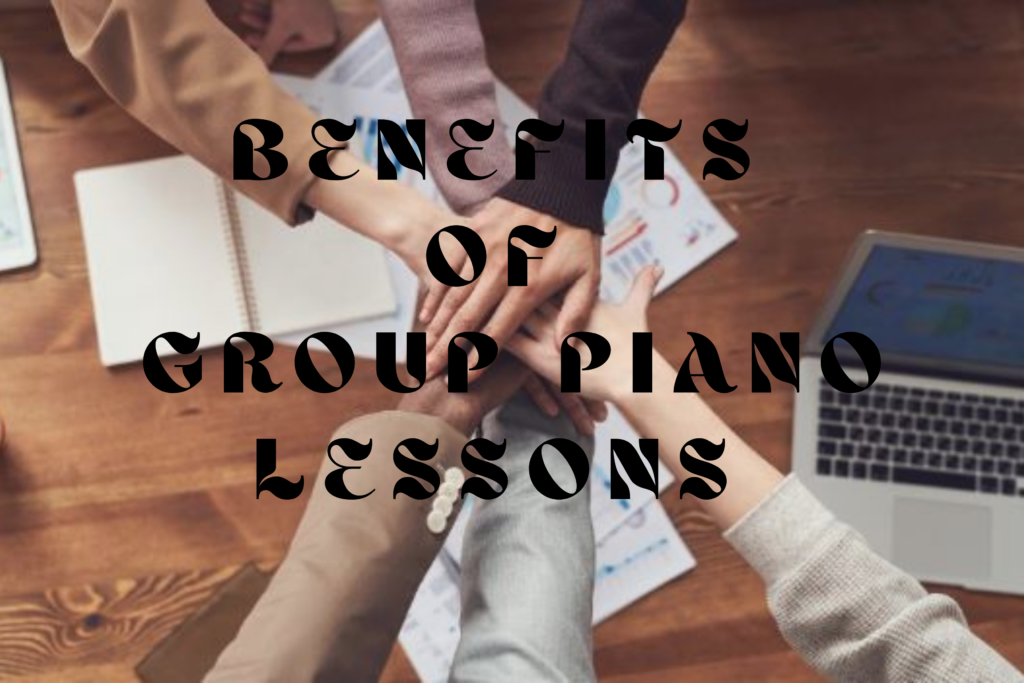Piano Lessons
8 Surprising Benefits of Group Piano Lessons for All Ages
8 Surprising Benefits of Group Piano Lessons for All Ages: How Collaborative Learning Can Take Your Piano Skills to the Next Level.
Learning to play the piano is a rewarding and enjoyable experience. Whether you are a beginner, an advanced student, or an adult who wants to take up a new hobby, there are many benefits to studying piano lessons in a group setting.
In this article, we will explore eight reasons why group piano lessons may be the perfect choice for you.
Cost-effective
Learning to play the piano can be an expensive undertaking, especially if you are a beginner. By taking lessons in a group setting, you can share the cost of tuition and materials with other students, making it more affordable for everyone.
Image by Tirachard Kumtanom from pexels
According to the study conducted by Duckworth and Lund (1975), teaching time can be reduced by as much as one-third for groups of two to four students, and it can be reduced by as much as one-half for classes of five to twelve students without a serious decrement in learning. This means that you can get the same level of instruction as you would in one-to-one lessons but at a lower cost.
Develops Social Skills
Group piano lessons provide a social environment that can help students develop their social skills. Students can interact with each other, discuss their progress, and provide feedback to each other. This interaction can help them develop the ability to communicate effectively, work collaboratively, and develop positive relationships with others.

According to Thompson (1983, 1984), group learning provides greater opportunities for collaborative learning and pooling resources, allowing the teacher to use their knowledge as a resource and play down the role of leader. Students who are involved in group lessons have higher levels of productivity and commitment, which results from the social interaction they have with their peers.
Helps with Motivation
Learning to play the piano requires a lot of practice, and it can be easy to become demotivated if you are practicing alone. By taking lessons in a group setting, you can draw motivation from your peers. You can see how they are progressing and learn from their experience, which can help to keep you motivated and focused on your goals.

According to the study conducted by Seipp (1976), students as a whole view group instruction as potentially enjoyable and perceive it as less effective than one-to-one instruction. However, student attitudes toward group instruction tend to be negatively affected by the perception that individual attention leads to greater productivity in learning.
Develops Listening Skills
Playing the piano requires excellent listening skills. Group piano lessons can help students develop these skills by exposing them to different playing styles, rhythms, and tempos. Students can listen to each other play and learn from their mistakes, which can help them develop better listening skills.
Image by JESHOOTS.com from pexels
According to the study conducted by Stevens (1987), critical analysis is used by all teachers as a means of maintaining interest and attention. Students who are exposed to this type of analysis develop more advanced listening skills, which help them to develop better interpretive judgment and auditory-visual discrimination.
Provides Support
Learning to play the piano can be a challenging experience, and it is essential to have support during the learning process. Group piano lessons can provide this support by allowing students to learn from each other and provide feedback on their progress. This support can help students feel more confident and motivated to continue their piano studies.

According to the study conducted by Robison (1999), group learning environments provide an effective support system for students. Students who are involved in group lessons develop higher levels of commitment, acquisition of skills, musicianship, information, and social interaction.
Improves Sight Reading Skills
Sight reading is a critical skill for piano players, and it can be challenging to develop this skill on your own. Group piano lessons can help students improve their sight-reading skills by providing opportunities to read music together and practice playing together.
According to the study conducted by Seipp (1976), group piano lessons offer advantages over one-on-one instruction in terms of sight-reading ability and can foster a sense of community and interaction among students. Furthermore, group lessons provide the opportunity for students to learn from one another, develop ensemble skills, and engage in collaborative music-making, leading to a more well-rounded musical education. As highlighted by Thompson (1983, 1984), group lessons provide a greater opportunity for collaborative learning and pooling of resources, and can lead to higher levels of productivity when students are involved at all times. Additionally, Stevens (1987) found that critical analysis and peer learning were effective teaching techniques in group piano lessons, which can also increase motivation and engagement among students.
Peer learning and collaboration
Group piano lessons provide an excellent opportunity for students to learn from one another through collaboration and peer learning. Students can help each other with their weaknesses while showcasing their strengths. This approach is especially helpful for beginners who may not have as much experience as advanced learners.

Studies have found that collaborative learning enhances the depth of learning, improves communication skills, and helps to develop social skills (Stevens, 1987). Through group piano lessons, students learn to share their ideas and contribute to the class. This collaborative learning environment fosters a sense of community and helps students to develop essential social skills.
Accountability
In group piano lessons, students are accountable to one another and the teacher. This accountability ensures that students stay on track with their learning goals and progress. As students learn together, they hold each other accountable for their progress and help each other to stay motivated.
Studies have found that students who are held accountable by their peers and teachers perform better and are more likely to reach their goals (Duckworth, 1960). Through group piano lessons, students can develop a sense of responsibility and accountability towards their peers and teacher, helping them to stay on track with their learning goals.
Conclusion
In conclusion, group piano lessons provide a range of benefits for beginners, advanced children, and adults. From social interaction to accountability, collaboration, and cost-effectiveness, group piano lessons are an excellent way to learn to play the piano. By taking advantage of these benefits, students can develop their musical skills while building social connections and having fun. So, why not book a group piano lesson today and discover the benefits for yourself?
Contact WKMT for more info about these group piano sessions!
References:
Duckworth, W. H. (1960). The effect of a small-group teaching situation upon the achievement of college piano students. Journal of Research in Music Education, 8(2), 87-94.
Duckworth, W. H., & Lund, N. A. (1975). Group piano teaching: Comparison of group and individual instruction. Journal of Research in Music Education, 23(2), 101-109.
Robison, J. D. (1999). The effects of group singing instruction on the performance of beginning voice students in the tertiary classroom. Journal of Music Theory Pedagogy, 13, 49-65.
Stevens, R. J. (1987). An interaction analysis of teaching behaviour and student response patterns in the piano classes of four British group piano teachers (beginning levels). Psychology of Music, 15(1), 3-11.




Pingback: How to be a better Sight-reader